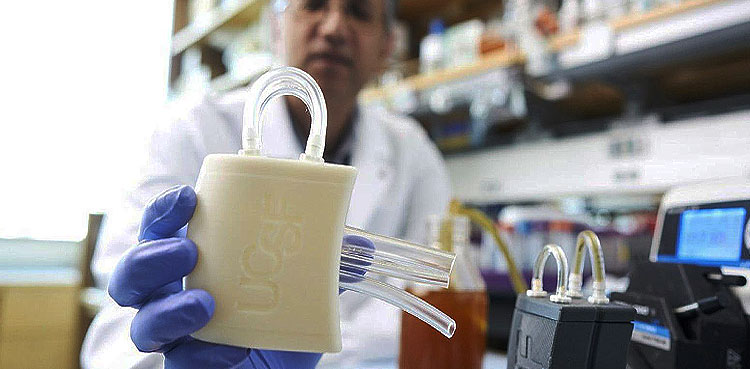
Scientists at University of California San Francisco are working on a new approach to treating kidney failure that could one day free people from needing dialysis or having to take harsh drugs to suppress their immune system after a transplant.
They have shown for the first time that kidney cells, housed in an implantable device called a bioreactor, can survive inside the body of a pig and mimic several important kidney functions. The device can work quietly in the background, like a pacemaker, and does not trigger the recipient’s immune system to go on the attack.
The findings, published in Nature Communications on August 29, 2023, are an important step forward for The Kidney Project, which is jointly headed by UCSF’s Shuvo Roy, Ph.D. (technical director) and Vanderbilt University Medical Center’s William H. Fissell, M.D. (medical director).
Eventually, scientists plan to fill the bioreactor with different kidney cells that perform vital functions like balancing the body’s fluids and releasing hormones to regulate blood pressure — then pair it with a device that filters waste from the blood.
A green light for The Kidney Project
The team tracked the kidney cells and the recipient animals for seven days after transplantation and both did well. The next step will be month-long trials, as required by the U.S. Food and Drug Administration (FDA), first in animals and eventually in humans.
“We needed to prove that a functional bioreactor will not require immunosuppressant drugs, and we did,” Roy said. “We had no complications and can now iterate up, reaching for the whole panel of kidney functions at the human scale.”
Authors: Additional UCSF authors are Eun Jung Kim, Ph.D., Caressa Chen, M.D., Rebecca Gologorsky, M.D., Ana Santandreu, Alonso Torres, Nathan Wright, M.S., Jarrett Moyer, M.D., Benjamin W. Chui, Ph.D., Charles Blaha, M.S., Paul Brakeman, M.D., Ph.D., Shant Vartanian, M.D., and Qizhi Tang, Ph.D.
from Science and Technology News - Latest science and technology news https://ift.tt/Wc25osw
via IFTTT
